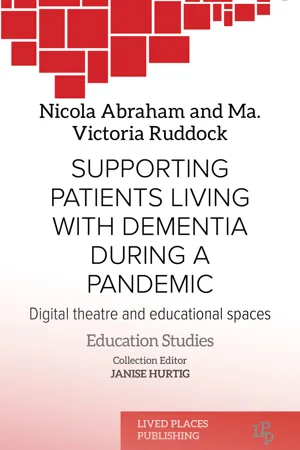
Supporting Patients Living with Dementia During a Pandemic
Digital Theatre and Educational Spaces
- English
- PDF
- Available on iOS & Android
Supporting Patients Living with Dementia During a Pandemic
Digital Theatre and Educational Spaces
About this book
How did a group of higher education applied theatre placement students learn to connect with patients living with dementia, in an acute hospital setting, during a global pandemic? How did they navigate the liminal spaces of inhabiting a virtual space while striving for real-life presence and an equality of learning and knowledge exchange?
In this book, authors and project leaders Dr Nicola Abraham PhD and Ma. Victoria Ruddock BSN present narratives and anecdotal examples of how the COVID-19 pandemic impacted the learning of these placement students and how they adapted the learning expectations of the project in order to account for the liminality of combining virtual and in-person space inhabitation.
Through stories and reflections from the project the authors explore the meaning of a pedagogy of reciprocity and ways of navigating uncertainty. They discuss the essential need for horizontal team structures to enhance learning experiences and consider the uses of transmedia communication tools.
Frequently asked questions
- Essential is ideal for learners and professionals who enjoy exploring a wide range of subjects. Access the Essential Library with 800,000+ trusted titles and best-sellers across business, personal growth, and the humanities. Includes unlimited reading time and Standard Read Aloud voice.
- Complete: Perfect for advanced learners and researchers needing full, unrestricted access. Unlock 1.4M+ books across hundreds of subjects, including academic and specialized titles. The Complete Plan also includes advanced features like Premium Read Aloud and Research Assistant.
Please note we cannot support devices running on iOS 13 and Android 7 or earlier. Learn more about using the app.
Information
Table of contents
- Supporting patients living with dementia during a pandemic
- Supporting patients living with dementia during a pandemic
- Copyright Page
- A message from the author
- Abstract
- Contents
- Acknowledgements
- Objective one
- Objective two
- Objective three
- Objective four
- Objective five
- Introduction
- 1 Acute ambitions to be yourself (I)
- 2 Playful ageing (you)
- 3 Reciprocity and uncertainty (we)
- Conclusion
- References
- Recommended further reading
- Index